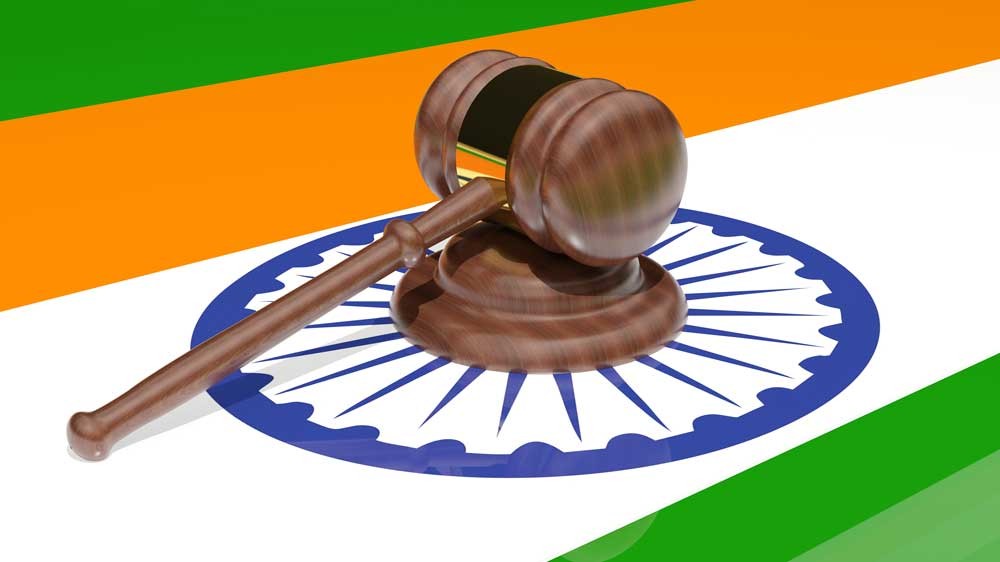UPSC CURRENT AFFAIRS – 04th April 2025
Instant injustice
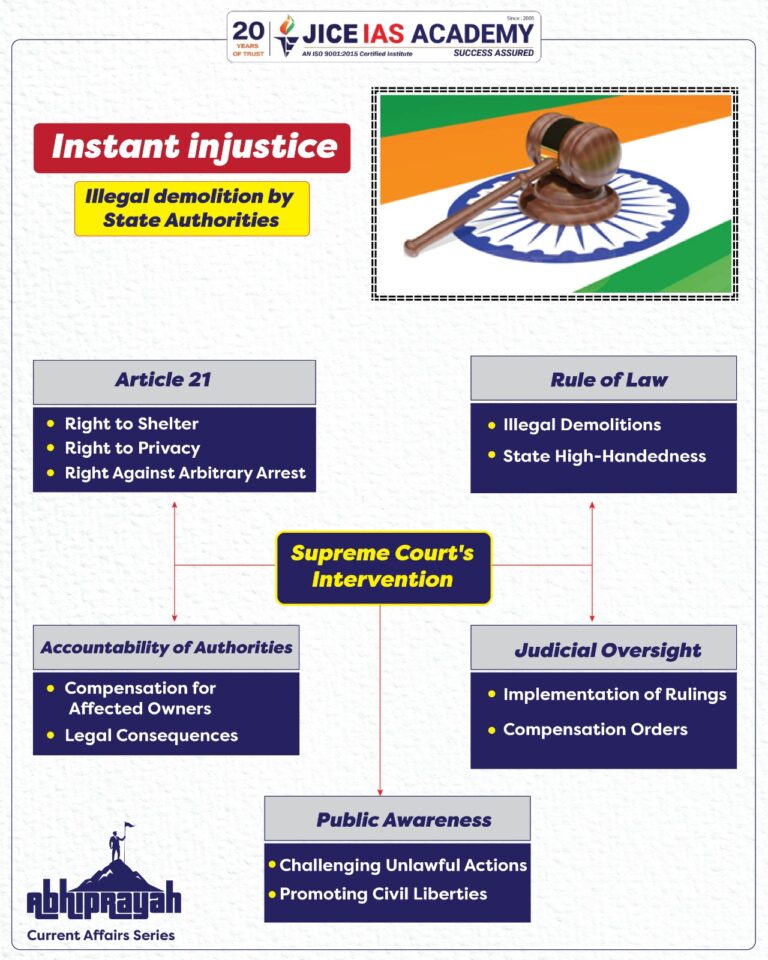
Why in News?
The Supreme Court of India has strongly criticized the illegal demolition of properties by state authorities without due process, reaffirming the fundamental principles of the rule of law and the right to shelter under Article 21 of the Constitution.
Introduction
- The rule of law is a fundamental pillar of a democratic society, ensuring justice, fairness, and protection of fundamental rights.
- Arbitrary and biased law enforcement has undermined the rule of law in India for decades, leading to concerns over human rights violations.
- Instances of custodial torture, extrajudicial killings, and illegal demolitions highlight the growing trend of state high-handedness.
Judicial Intervention and Supreme Court’s Observations
- The Supreme Court of India recently criticized the illegal demolition of properties in Prayagraj, Uttar Pradesh, stating that it “shocked the conscience” of the Court.
- A Bench led by Justice A.S. Oka observed that the demolitions were conducted without serving show-cause notices to the owners.
- The Court reaffirmed that:
- There can be no punishment without trial.
- Collective punishment is unlawful.
- Every individual is presumed innocent until proven guilty.
- The right to shelter is an integral part of Article 21 of the Indian Constitution.
- The Court ordered ₹10 lakh as compensation for each affected house owner.
Growing Trend of Extra-Legal Punishments
- Despite judicial disapproval, the practice of bulldozing properties without due process continues in various states.
- Originally observed in Bharatiya Janata Party (BJP)-ruled states, the trend has now spread beyond partisan lines.
- In Punjab, the Aam Aadmi Party (AAP) government used property demolition as a tool in its campaign against the drug mafia.
- The widespread social approval of such actions reflects a decline in governance standards and the normalization of state high-handedness.
Concerns Over State-Sanctioned Mob Justice
- The state has a constitutional duty to curb mob lynching and ensure law and order.
- When the state itself resorts to tactics resembling mob justice, it erodes public trust in institutions.
- Bypassing legal procedures sets a dangerous precedent and threatens civil liberties.
Way Forward: Ensuring Rule of Law
- Judicial Oversight: The Supreme Court must ensure strict implementation of its rulings across all states.
- Accountability of Authorities: Officials responsible for extra-legal demolitions should be held accountable.
- Public Awareness: Citizens must be made aware of their rights to challenge unlawful state actions.
- Strengthening Due Process: All legal procedures, including proper investigation and trials, must be strictly followed before any punitive action.
Article 21 of the Indian Constitution
“No person shall be deprived of his life or personal liberty except according to the procedure established by law.”
Key Features of Article 21:
- Fundamental Right: It is a fundamental right under Part III of the Indian Constitution.
- Available to Citizens and Non-Citizens: It applies to both Indian citizens and foreigners within the territory of India.
- Protection Against State Actions: The state cannot take away a person’s life or personal liberty except through a fair and just legal procedure.
Interpretation and Expansion by the Supreme Court
Over the years, the Supreme Court has expanded the scope of Article 21 to include various rights essential for a dignified life. Some important interpretations include:
- Right to Live with Human Dignity
- In Francis Coralie Mullin v. Union Territory of Delhi (1981), the Supreme Court held that life under Article 21 means more than mere animal existence. It includes dignity, education, health, and livelihood.
- Right to Shelter
- In Olga Tellis v. Bombay Municipal Corporation (1985), the Court ruled that the right to shelter is part of the right to life, as a home is essential for a dignified existence.
- The recent Supreme Court order on illegal demolitions in Prayagraj reaffirmed that demolishing homes without following due process violates Article 21.
- Right to Privacy
- In K.S. Puttaswamy v. Union of India (2017), the Supreme Court declared that the right to privacy is a fundamental right under Article 21.
- Right Against Arbitrary Arrest and Torture
- In D.K. Basu v. State of West Bengal (1997), the Court issued guidelines against custodial torture and emphasized that no person can be deprived of life or liberty through illegal arrests.
- Right to a Pollution-Free Environment
- In M.C. Mehta v. Union of India (1987), the Supreme Court ruled that the right to a clean environment is part of Article 21.
Conclusion
- The rule of law is the bedrock of democracy and must be upheld at all costs.
- The state must not act as a mob but rather as a guardian of justice, ensuring that every citizen receives fair treatment under the law.
- Judicial interventions must translate into effective policy implementation to prevent further erosion of constitutional values.
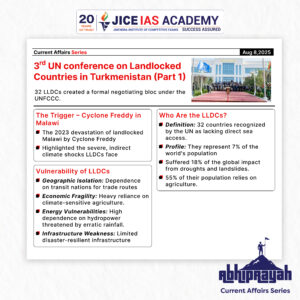
3rd UN conference on landlocked countries
UPSC CURRENT AFFAIRS – 08th August 2025 Home / 3rd UN conference on landlocked countries Why in News? At the
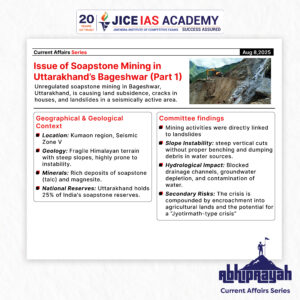
Issue of soapstone mining in Uttarakhand’s Bageshwar
UPSC CURRENT AFFAIRS – 08th August 2025 Home / Issue of soapstone mining in Uttarakhand’s Bageshwar Why in News? Unregulated
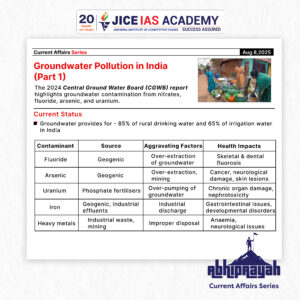
Groundwater Pollution in India – A Silent Public Health Emergency
UPSC CURRENT AFFAIRS – 08th August 2025 Home / Groundwater Pollution in India – A Silent Public Health Emergency Why
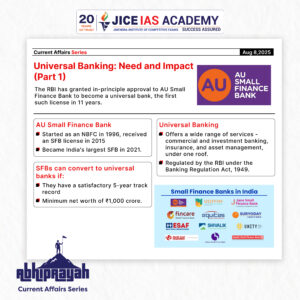
Universal banking- need and impact
UPSC CURRENT AFFAIRS – 08th August 2025 Home / Universal banking- need and impact Why in News? The Reserve Bank
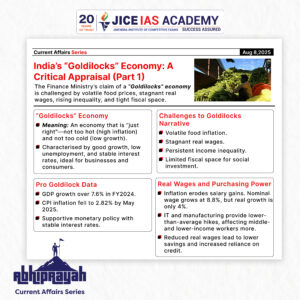
India’s “Goldilocks” Economy: A Critical Appraisal
UPSC CURRENT AFFAIRS – 08th August 2025 Home / India’s “Goldilocks” Economy: A Critical Appraisal Why in News? The Finance
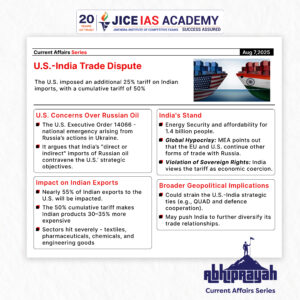
U.S.-India Trade Dispute: Trump’s 50% Tariffs and India’s Oil Imports from Russia
UPSC CURRENT AFFAIRS – 07th August 2025 Home / U.S.-India Trade Dispute: Trump’s 50% Tariffs and India’s Oil Imports from
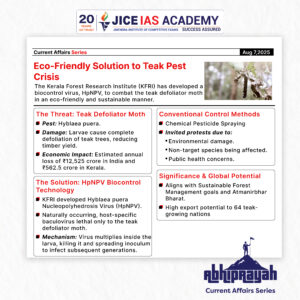
Eco-Friendly Solution to Teak Pest Crisis: KFRI’s HpNPV Technology
UPSC CURRENT AFFAIRS – 07th August 2025 Home / Eco-Friendly Solution to Teak Pest Crisis: KFRI’s HpNPV Technology Why in

New Species of Non-Venomous Rain Snake Discovered in Mizoram
UPSC CURRENT AFFAIRS – 07th August 2025 Home / New Species of Non-Venomous Rain Snake Discovered in Mizoram Why in

